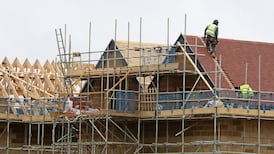A public furore ensued over the last 10 days after this newspaper revealed that many companies claiming taxpayer Covid subsidies were also seemingly able to afford large cash dividends for their shareholders. But they are not the only ones claiming State assistance they clearly did not need to get by. The payment of a cash dividend is not the only marker of a successful year in business.
In May 2020, Pat McDonagh, the wealthy founder of the Supermac’s chain of fast food outlets, appeared on RTÉ Radio 1 in a memorable interview with presenter Sarah McInerney. He was complaining about the perceived generosity of the State Covid assistance scheme for displaced employees, the pandemic unemployment payment (PUP), which paid workers €350 per week.
McDonagh, whose workforce includes a large cohort on the minimum wage, glibly suggested on air that going on the PUP was like “winning the lotto” for some workers. McInerney, in her inimitable fashion, grilled him like one of his burgers and the businessman was widely panned for his comments.
But the Galway man is a redoubtable character and not the sort to let a little bit of public criticism keep him down. Since that RTÉ radio interview, the businessman has doubled down on his criticism of the generosity of State Covid payments to workers. In recent months, he suggested that PUP has made Irish workers “lazy”.
In another interview with the Mail on Sunday about the risk of foreign PUP claimants taking payments while abroad, he made comments that also could be applied more generally: “In two or three years’ time when all this has to be paid back, somebody is going to be saying: ‘Why did we waste money at the time?’”
Why, indeed, did we waste money on certain taxpayer-funded Covid payments? McDonagh is correct about that, especially if the same logic is applied to State payments to businesses, which he has never criticised to the same degree as he has the payments to workers.
Covid payments
Supermac’s Holdings, the group that owns McDonagh’s fast-food interests and hotels, claimed taxpayer-funded Covid payments last year of well north of €6 million, its accounts suggest. This includes wage subsidies to his fast-food business and hotels and also payments under the Covid Restrictions Support Scheme (CRSS), which applied to his hotels when their trading was restricted.
McDonagh’s business was perfectly entitled to claim these payments, just as many workers were entitled to claim the PUP. But there is no doubting the generosity of the taxpayer-funded payments to McDonagh’s companies because it is abundantly clear that it could have managed perfectly well without them. It made profits in 2020 of €22.9 million, only 6.5 per cent down on 2019.
McDonagh’s group of companies recorded revenue of €141.5 million last year, a significant 25 per cent decline on 2019. But the damage was limited by a near €6 million jump in “other income”. In the three years prior to the pandemic, “other income” typically ranged from €2.1 million to €2.5 million. The accounts confirm that “other income” in 2020 was boosted by CRSS and Employment Wage Subsidy Scheme (EWSS) payments.
On top of this, McDonagh’s companies also received unspecified Temporary Wage Subsidy Scheme (TWSS) payments, which are docked off its wage bill to give a net total of almost €23 million. Wage payments were down by about €16 million or 41 per cent on the previous year, but staff numbers were down by only about 26 per cent or more than 500 workers.
This makes McDonagh’s companies’ TWSS receipts impossible to calculate precisely. But if the wage bill fell by twice the level of employees lost, it can be assumed that a large chunk of the cash saved came from taxpayer subsidies. It would not be a huge surprise if the total of taxpayer TWSS, EWSS and CRSS payments received by McDonagh’s companies last year was close to €10 million.
Yet it generated €29.6 million in cash from its operations in 2020, it made profits of almost €23 million and it had net assets of €164 million. McDonagh’s business did not pay him a dividend last year, but records show it has continued to claim State subsidies in 2021, even after such a financially successful 2020.
Legal entitlement
It is obvious that his group was legally entitled to claim its subsidies. But it is also perfectly obvious that it would have muddled through just fine without taxpayer help, with McDonagh’s fast-food operation subsidising his hotels instead of the State doing so. There are many other businesses in similar positions.
It can be argued that the wage subsidies, in particular, were designed to prevent job losses. But as McDonagh has repeatedly argued himself over the past 18 months, his problem in business is an acute lack of staff, not an excess of them.
The Minister for Finance, Paschal Donohoe, this week complained that the law does not allow him to reclaim State Covid subsidies from businesses that went on to perform extremely well financially while on taxpayer-funded corporate welfare. Yet he is the politician who introduced that law; he tied his own hands.
So why doesn’t he untie them, and change the law to better protect the interests of taxpayers when paying subsidies to thriving companies in future?











